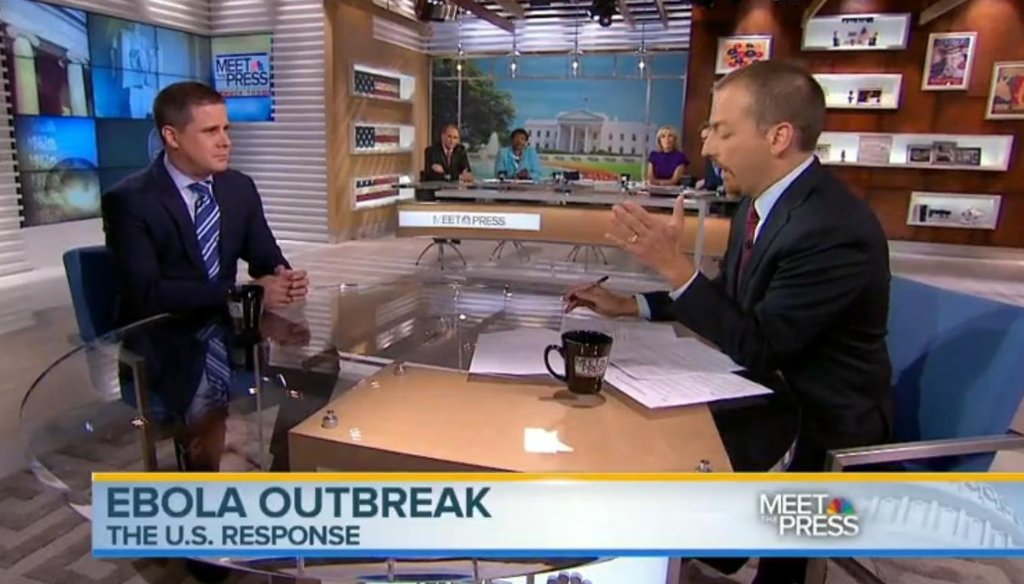Stand up for the facts!
Our only agenda is to publish the truth so you can be an informed participant in democracy.
We need your help.
I would like to contribute

The Sunday shows, including "Meet the Press," discussed the Ebola outbreak.
Conservatives on Sunday wanted to discuss people’s waning faith in government.
On CNN’s State of the Union, Sen. Lindsey Graham, R-S.C., rattled off a laundry list of failures of Congress and President Barack Obama. On Fox News Sunday, conservative pundit George Will compared the mindset of Americans today to the Ronald Reagan years.
Graham was asked what Republicans should prioritize if they take control of the Senate in the midterm elections.
"You just heard a segment about the spread of Ebola throughout Africa. We're cutting the CDC's budget, the NIH budget," Graham said. "We're taking the military budget under sequestration cuts down to the smallest Army since 1940, the smallest Navy since 1915. We're destroying the Intelligence Committee.
"I want to sit down with Sen. (John) McCain, Jack Reed, Dianne Feinstein, a coalition of the willing, to replace these defense and non-defense cuts that are destroying our ability to protect our country," Graham said.
Sign up for PolitiFact texts
We decided to look at Graham’s claim that the United States now has "the smallest Army since 1940, the smallest Navy since 1915."
That rates Half True.
Graham was referring to the number of ground forces and the number of ships, which is a traditional way of measuring the size of the Army and Navy, respectively, said Alex Roland, a professor of military history at Duke University.
Graham’s staff pointed us to a 2011 letter written by former Defense Secretary Leon Panetta.
In the letter, Panetta said, "Facing such large reductions, we would have to reduce the size of the military sharply. Rough estimates suggest after 10 years of these cuts, we would have the smallest ground force since 1940, the smallest number of ships since 1915, and the smallest Air Force in its history."
Experts, however, say that the comparison is problematic and largely irrelevant.
Because of technological advances, the ships and troops of today’s military have greater capabilities than they did in the world wars.
"One of the reasons for the decrease in size -- both Army and Navy -- is that we now rely far more on technology than on sheer numbers," Roland said. "The question is not how we compare to our Army in 1940 or our Navy in 1915, but how we compare with our potential enemies in 2014. We are head and shoulders above them."
For example, the Navy did not have any aircraft carriers in 1915, but now it has an active fleet of 10. David E. Johnson, a political scientist at the Rand Corporation, estimated that just four modern aircraft carriers would have capabilities equal to that of the entire Navy before World War I.
Also, in terms of military spending relative to other countries, the United States accounts for 37 percent of the world’s total military spending. China follows, at 11 percent of the world’s spending, as of 2013, according to the Stockholm International Peace Research Institute.
Over on Fox, Will locked into a debate with Juan Williams and Brit Hume about America’s willingness to trust its government.
"You know, if I look at the polls, which is what I do, I see the polls indicate in fact the crisis -- the level of people saying we're going the wrong direction is about what it's always been," Williams said.
"They don't always say that," Hume countered.
Will then pivoted to a Reagan comparison.
"The last time there was a sustained surge of confidence in government's competence was under Ronald Reagan," Will claimed.
That rates False.
Polls show that the most recent surge in Americans trusting their government happened while President Bill Clinton was in office. And Clinton, obviously, was president more recently than Reagan.
The Pew Research Center averaged the results of a number of surveys since 1958 that probed the public’s trust in government. The results: Trust in government fluctuated during both the Reagan and Clinton presidencies, but trust rose more sharply in Clinton’s years.
According to data from American National Election Studies, trust in the federal government rose by 11 percentage points -- from 33 percent to 44 percent -- during the Reagan years. In the Clinton years, trust rose over 20 percentage points -- from 21 percent to 44 percent.
The consensus among the political scientists we contacted is that trust in government tracks closely with the economy.
"The growth in trust we observe under Reagan and Clinton coincides with economic expansions," said Brendan Nyhan, a professor of government at Dartmouth College.
In his forthcoming book, Why Washington Won’t Work: Polarization, Political Trust, and the Governing Crisis, Vanderbilt University political scientist Marc Hetherington analyzed how party affiliation changes the survey results for trust in government.
"Republicans in the electorate only seem to trust the government when Republicans are in office, Hetherington said. "Democrats trust government about the same amount over time. Republicans fluctuate a lot."
Our Sources
See individual fact-checks.














































